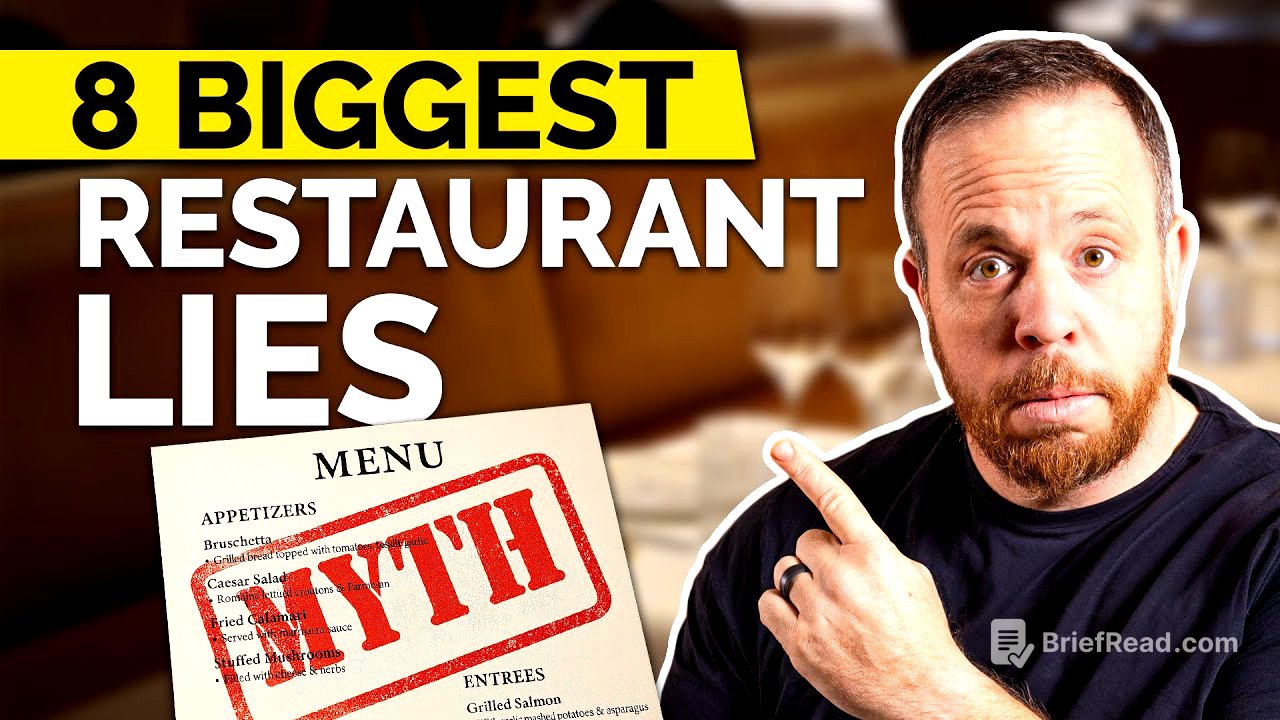TLDR;
The video addresses common misconceptions about running a successful restaurant. It emphasizes that good food alone isn't enough; factors like efficient systems, trained staff, and effective marketing are crucial. The video also debunks the myth that being busy equates to profitability, highlighting the importance of financial awareness and strategic pricing. Additionally, it challenges the notion that restaurant owners must overwork themselves, advocating for delegation and systemization. The video also touches on the importance of positive work environments, dispelling the idea that toxicity is a sign of artistry. Finally, it underscores the necessity of marketing and social media engagement for modern restaurants.
- Good food is just the entry ticket, not a guarantee of success.
- Being busy doesn't always mean profitable; financial awareness is key.
- Overworking yourself is not sustainable; systemization and delegation are essential.
- Toxicity is not artistry; respect and communication are vital in a kitchen.
- Marketing and social media are crucial for modern restaurants.
Myth 1: Good Food is Enough [0:00]
Having great food is important but it's not enough to guarantee success in the restaurant business. Many chefs with culinary accolades struggle with underfilled restaurants because impeccable food is simply the ticket to play, not the ticket to win. A restaurant's success depends on well-organized systems, a trained team, and effective marketing strategies. One example is a restaurant with average food that thrived because of its strong community connections and personalized customer service. To maximize the chances of success, restaurants should focus on both impeccable food and human connection. Profitability comes from engineering high-margin food items, proper menu engineering, owning your marketing, and training the front of house staff.
Myth 2: My Restaurant is Busy, So I’m Successful [2:20]
Being busy doesn't automatically mean a restaurant is successful. It's crucial to know your margins, labor costs, food costs, and profit percentage. A full restaurant that is losing money is not a success but a ticking time bomb. Financial awareness is more important than a full house because you need to know if that full house is actually generating profit.
Myth 3: I Can Outwork Everyone as a Restaurant Owner [2:53]
The idea that a restaurant owner must do everything themselves to ensure success is a trap. This mindset, driven by ego, fear, or a desire to save on payroll, ultimately leads to dropped balls, delayed growth, and perpetual involvement in day-to-day tasks. True freedom, growth, and profit come from building systemized workflows, training leaders, and trusting them to uphold standards. By hiring the right people and implementing repeatable systems, owners can free themselves to work on strategic growth initiatives.
Myth 4: Being a Toxic Jerk is Artistry [4:34]
Being a toxic jerk is not a sign of artistry but rather indicates that you're simply an a-hole. High-functioning kitchens thrive on respect and communication, not random tantrums. Screaming at your team every shift creates discontent, not masterpieces. The best kitchens are disciplined, respectful, and focused on consistency.
Myth 5: You Have to be an Emotional Wreck [5:23]
The portrayal of chefs as emotional wrecks who implode over minor issues is unrealistic. In reality, such individuals would struggle to handle the pressures of a lunch rush, let alone scale a profitable restaurant. Great kitchens are fun and disciplined, with a focus on consistency rather than the genius and breakdowns of individual chefs.
Myth 6: You Need to Underprice Your Restaurant Menu Items to Compete [6:06]
Trying to be the cheapest in the market is a race to the bottom. This strategy attracts the wrong customers, trains them to undervalue your offerings, and creates a constant struggle when raising prices. Instead, focus on providing an exceptional experience and value that makes customers disregard price. Pricing should be a strategy, not a reaction, allowing you to charge the right price for a healthy business.
Myth 7: Restaurant Marketing is Not Worth it [6:43]
Many restaurant owners waste money on ineffective marketing tactics, such as hiring social media people without a strategy or buying misplaced ads. Effective marketing is highly strategic and simple, focusing on optimizing Google My Business profiles, displaying social proof, gathering reviews, and implementing email and repeat customer strategies. Marketing is about targeting the right people with the right message in a human way built upon true human connection, not fluff.
Myth 8: Social Media Marketing DOESN’T work for Restaurants [8:01]
Relying solely on word of mouth is short-sighted in today's digital age. While word of mouth is still important, it now happens digitally through reviews and social media posts. Marketing is more important than side work because it's how people discover you, leading to more revenue and a healthy business. Not marketing is like standing in a crowded room, turning your head to the corner, and expecting people to befriend you.









